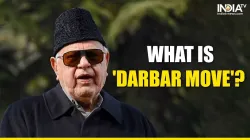Farooq Abdullah promises to restore 'Darbar Move' if voted to power in J-K: Know about 150-year-old practice
Opposition parties, particularly the National Conference, the Congress, the Apni Party, and the PDP, have been vocal about their commitment to restoring the traditional practice of the 'Darbar Move' if voted to power in the ongoing Assembly polls.

J-K Assembly elections 2024: National Conference (NC) president and former Jammu and Kashmir chief minister Farooq Abdullah on Thursday vowed to restore the historic practice of the 'Darbar Move' if his party is voted into power in the ongoing state Assembly elections. During his announcement, Farooq Abdullah highlighted its importance in maintaining unity between Jammu and Kashmir. "The Darbar Move was a bridge that kept Jammu and Srinagar connected, politically, economically, and emotionally. Abandoning it creates a divide between the two regions, which we cannot afford," Abdullah stated.
If the National Conference wins the 2024 elections, Abdullah assured that the party would immediately revive the practice, reinstating it as a core governance model in the region. Opposition parties including the National Conference, the Congress, the Apni Party and the People’s Democratic Party have been promising the revival of the practice.
What is 'Darbar Move'?
The 'Darbar Move' is a 152-year-old practice initiated during the reign of Maharaja Ranbir Singh in 1872. Under this biannual ritual, the government offices, including the civil secretariat, would shift between the summer capital, Srinagar, and the winter capital, Jammu, every six months. This arrangement allowed government officials and their machinery to function from Srinagar during the summer months (May to October) and from Jammu during the winter (November to April).
The move was originally conceived to provide a balanced focus on both regions of Jammu and Kashmir. With its alternating capitals, the practice aimed to prevent regional disparities and offer the government better access to all corners of the state.
Significance of the 'Darbar Move'
The 'Darbar Move' has been more than just a symbolic event. It was seen as a unifying practice, ensuring that both Jammu and Srinagar received equitable administrative attention. The tradition allowed the government to remain connected with the people of both regions and provided seasonal economic benefits to local businesses in both cities.
For decades, the biannual shift brought life to the otherwise sleepy capital of Jammu during the winter months, providing a bustling atmosphere with the influx of government employees. Similarly, in Srinagar, it marked the height of administrative activity during the warmer months.
Controversy and Suspension
However, the practice has not been without controversy. It has been long argued that the 'Darbar Move' is an expensive exercise that burdens the state exchequer. The shifting of government offices, records, and personnel twice a year incurs significant costs in terms of transportation and logistics, estimated to be in the hundreds of crores annually. Amid the COVID-19 pandemic and growing concerns about costs, the government of Jammu and Kashmir, under the administration of Lieutenant Governor Manoj Sinha, suspended the practice on June 30, 2021. Despite the move’s suspension, the 'Darbar Move' remains a sensitive political and cultural issue in the region, particularly among those who see it as a symbol of inclusivity and regional harmony.